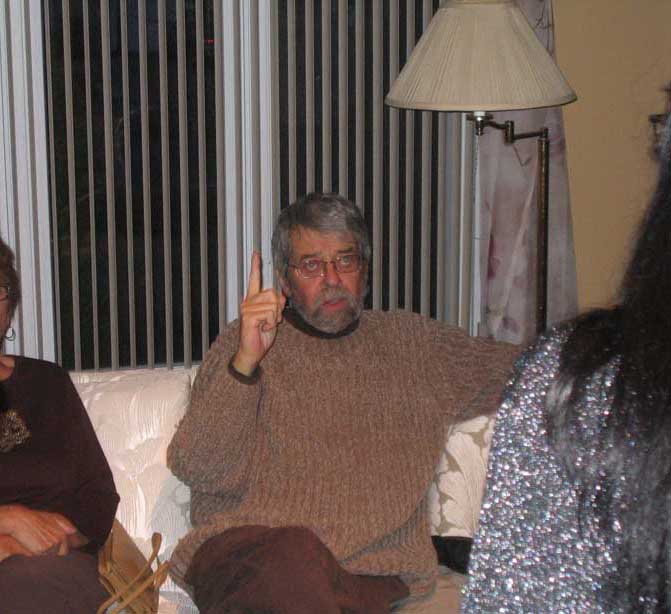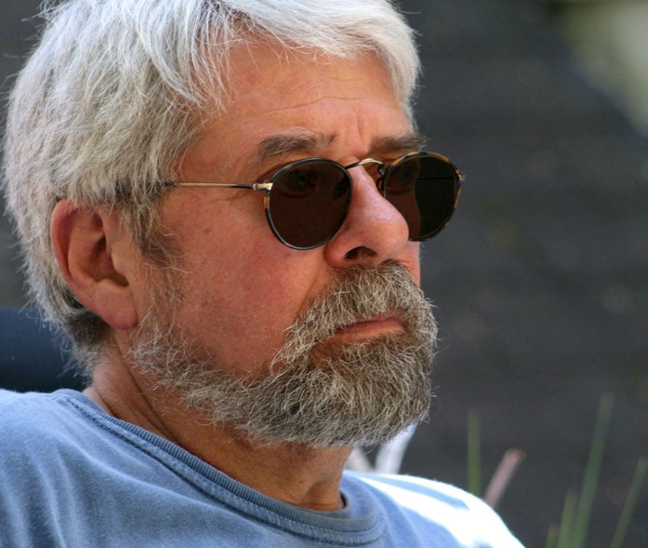André, c'était mon oncle
André, ce témoignage restera et se bonifiera...
(faire défiler pour prendre connaissance de cette page au complet)
Ben voici un petit collage des trucs qui me passèrent par l'esprit en ce qui a trait à André. Bien sûr j'ai de bien meilleures photos que je ne manquerai pas d'ajouter au fil du temps.
Voici la dernière photo que j'ai prise d'André, prise le 12 avril 2009; pas une pose fantastique, mais bon, la voici:
(Sous des airs anodins s'y cachent des trésors: André assis sur le sofa de sa mère, surplombé de la lampe de Thérèse; à côté de Marcelle, ma mère et soeur d'André)

Je me dois d'inclure ce texte, que j'ai trouvé très bon, en cette page...
Texte du: 10:02AM le 19 juin 2009 Agence de publicité/Allard Johnson Communications
André Blanchard décède
En 1970, André Blanchard entreprend sa carrière de publicitaire chez McKim (CP Air, CP Hôtels, Gillette et Seven-Up) pour ensuite poursuivre chez Foster (O'Keefe et GM), BCP (Labatt, Bombardier) et Ronalds-Reynolds (Air France, Toyota, Texaco). Il devient directeur de la création chez Allard Lesiège en 1978. Sous sa gouverne, de grandes campagnes verront le jour, dont celles de la Banque Royale (Parlez-moi d'une banque royale), des Rôtisseries St-Hubert et de Loto-Québec (Mini Loto). En 1980, grâce à lui et à ses collègues, l’agence est désignée « agence de l’année ». Puis, André fait un bref séjour de trois ans chez JWT où il travaille aux comptes de Kraft, Pepsi, Ford et Lever. En 1984, le créatif revient définitivement chez Allard Communication Marketing. Il bâtit alors une solide équipe de création tout en participant activement à l'orientation de l'agence. Avant de se retirer de la vie active dans sa paisible campagne à Saint-Joachim, André Blanchard a été l’artisan de nombreuses campagnes d'Allard Johnson Communications, notamment pour KLM, Walmart et RBC. Doté d’une plume toujours inspirée, on se rappellera de lui comme d'un bon vivant, un passionné de la pub, un amoureux de la vie et un être doté d’un sens de l'humour incomparable.Salut André. Et surtout, Merci.
Les funérailles auront lieu le 27 juin 2009 à 11 h, en l’Église Saint-Joachim, située au 655, rue Principale, Saint-Joachim-de-Shefford. La famille recevra les condoléances sur place, une heure avant la cérémonie.
Lorraine, 18 octobre 2009
André Blanchard, c'était mon oncle, et c'est aujourd'hui une source d'inspiration constante dans chaque texte que j'écris, chaque page web que je produis. Je n'ai pas reçu d'André une formation vaste et complète de son savoir, mais c'est à travers de petits gestes, commentaires et autres que je me suis fait une idée de la philosophie et de la vision qu'André employait en produisant un texte. Je n'aurai jamais la prétention de le rejoindre à ce niveau; seulement je dis qu'il est pour moi une source importante d'inspiration même s'il n'est plus à mes côtés pour me corriger... Il n'est plus là en tant que personne physique mais sa contribution, son passage parmi nous continue de nous enrichir pour le reste de nos vies. Et ceci sera transmis à tous les petits descendants de notre famille. Ce succès, ce savoir continuera, si ce n'est que pour un enfant de savoir qu'un membre de notre famille a vécu de cette façon et a accompli ces choses. C'est difficile à croire et encore plus dur d'accepter qu'il n'est plus là avec nous; alors j'y renonce! Et ce savoir qu'il m'a transmis est déjà au travail, et sera utilisé pour le bien de ma famille et de quiconque en éprouvera le besoin.

Pour revenir à la page de Benoit Ratelle , cliquez le lien.
Au fait, André, je suis finalement tombé sur ce texte qui explique une question que je t'avais posée et dont tu ne savais pas la réponse:
If both Germany and Russia invaded Poland in 1939 why did Britain not declare war on Russia as well as Germany? In: World War 2 [Edit categories] World War 2 Draft Find enlistment records, gravesites regimental histories and more. www.Ancestry.ca Ads by Google [Improve] Answer In short, since the defensive pact between Britain, France and Poland said nothing about the Soviet Union, the British and French refused to declare war against them. Read below for more context. Prior to the German invasion of Poland on September 1, 1939, Poland, Britain and France made a defensive pact against the Germans, stating that if one of them was attacked, the other two would declare war against Germany. It is often stated that Britain and France responded to Germany's annexation of Czechoslovakia in March 1939 (a violation of the Munich agreement) by "guaranteeing the integrity of the Polish state". This is an incomplete explanation, as the agreement was for all three states to declare war against Germany (and it only pertained to Germany) if one of those three were attacked by Germany. Meanwhile, there was a political battle going on between Britain/France and Germany to get Soviet support in an eventual military conflict. Germany won this battle with a secret non-aggression pact that would partition Poland between the two states when they invaded it. This is what led to the German invasion of, and declaration of war on, Poland on September 1st. On September 3rd, the British and French, stunned by the boldness of Hitler (they had not expected him to actually attack), declared war on Germany, as per the agreement they had made with Poland. However, since the agreement did not specify military action, neither Britain nor France engaged Germany in any fighting until Germany invaded France the following year. This has been dubbed the "phony war", because of a lack of fighting by the British and French, but of course the war was ongoing in Poland, even after the capitulation of the Polish state and the exile of the Polish government to the British isles on September 28th, 1939. On September 17th, 1939 Poland was invaded on its eastern border by the Soviet Union. This attack, and the expectation of the attack itself, helped to split Polish defenses, and sped up the eventual defeat of the Polish military forces 11 days later. Since the defensive pact between Britain, France and Poland said nothing about the Soviet Union, the British and French refused to declare war against them, in keeping with their very technical and legalistic interpretation of the pact. Their hope was that Germany would stop with Poland, and not attack them next. One of the reasons cited for such a relatively easy defeat of Poland is that the Germans did not have to worry about the French troops on its Western border. German scouts were given the order to inform HQ if they saw so much as a single French soldier near the border, the response to which would have been a split of German forces to defend its western front while attacking Poland in the east. The scouts saw no one (possibly due to a combination of serendipity and an actual scarcity of French scouts near the border), so that virtually the entirety of Germany's forces were put into the attack on Poland, leaving Germany defenseless against a full western invasion from a superior number (at the time) of French forces for weeks. The lack of support from the Western "allies" and second frontal attack by the Soviets was too much for the Polish military, as was the single-front attack too much for France several months later. Only once Germany brought the Soviet Union and the United States (via their ally Japan's attack on Pearl Harbor) into the war against itself did it get defeated by a two-front war.
Et voilà...